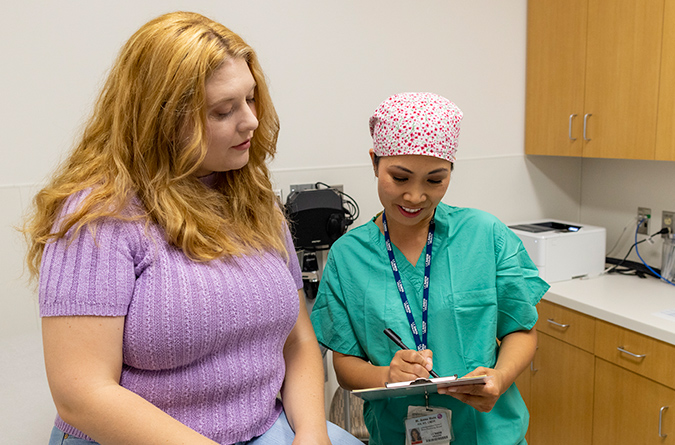Bacterial Infections
Bacterial infections can lead to life-threatening complications. Our specialists offer the latest treatments to get you well and limit disease spread.
Medically reviewed by Dean Blumberg, M.D. on Nov. 08, 2023.

Expert Care for Bacterial Infections
The UC Davis Health Division of Infectious Diseases experts treat common and rare bacterial infections. We’re nationally recognized for our expertise in infection prevention and care.
Our Difference
Care for All Ages
Certain bacterial infections are highly contagious. Our adult and pediatric infectious disease specialists work together to protect everyone in your family.
Infectious Diseases Clinics
Doctors across Northern California refer their patients to our Infectious Diseases Clinic for advanced care. UC Davis Medical Center also has an on-site Acute Infections Management Service (AIMS) that provides outpatient IV antibiotics for certain types of infectious diseases.
Innovative Research
Our doctors are actively involved in infectious disease clinical research. We’re dedicated to finding new ways to prevent and treat bacterial infections and stop the spread of disease.
What Are Bacterial Infections?
Bacterial infections affect your blood, skin, lungs or other organs. There are different types of bacterial infections, each with distinct causes and symptoms. Antibiotics treat most bacterial infections.
Common Bacterial Infections
Bacterial Meningitis
Bacterial meningitis causes swelling in the tissue layers (meninges) that surround your brain and spinal cord. Vaccines prevent certain types of bacterial meningitis.
Clostridioides difficile (C. diff)
C. diff causes swelling in your large intestine, which leads to severe diarrhea. Long-term use of antibiotics can cause this infection.
E. coli
MRSA
The MR in MRSA stands for Methicillin-resistant. Methicillin is an antibiotic that treats Staphylococcus aureus (staph) infections. When you have MRSA, the bacteria that cause the infection don’t respond to certain antibiotics. You can develop infections in your bones, blood, heart or lungs.
Pneumonia
Certain bacteria can cause distinct types of pneumonia. This infection causes your lungs to fill with fluids. Vaccines protect against some bacterial causes of pneumonia.
Salmonella
Salmonella bacteria are a common cause of food poisoning. You may have stomach cramps, diarrhea and fever. This illness is known as salmonella or salmonellosis.
Staph Infections
Staph infections occur when Staphylococcus aureus bacteria that naturally live in your nose and on your skin enter your body. This can lead to infections in your blood, bones, lungs, heart and other parts of your body.
Strep Throat
Group A Streptococcus (group A strep) bacteria that live in your nose and throat cause strep throat infections. This contagious illness causes fever, a painful sore throat and swollen tonsils.
Whooping Cough (Pertussis)
Bordetella pertussis bacteria cause whooping cough. This highly contagious infection causes severe coughing fits. It’s especially dangerous to infants and young children. Vaccines prevent this bacterial infection.
Causes and Risk Factors of Bacterial Infections
Bacteria are living organisms that cause bacterial infections. These germs are everywhere. Some live on or in your body and may never cause harm. But bacteria can make you sick, especially if you have certain risk factors.
Top risk factors include:
Age
Health Conditions
Certain medical conditions make you more prone to bacterial infections. These conditions include HIV/AIDS, sickle cell disease and substance use disorders.
Inpatient Care
People receiving care in hospitals and group care facilities are more at risk for infections like MRSA, staph infections and C. diff.
Weakened Immune System
Autoimmune diseases, cancer treatments, surgeries and other illnesses and therapies can weaken your immune system. A weakened immune system has a harder time killing bad bacteria.
Why Treatment Matters
Many bacteria are helpful. They break down food and medicines. They also stop bad bacteria from multiplying and making you sick.
But infection-causing bacteria can quickly grow out of control. You can develop serious, potentially life-threatening complications.

Request an Appointment
As Sacramento's No. 1 hospital, you'll benefit from unique advantages in primary care and specialty care. This includes prevention, diagnosis and treatment options from experts in 150 specialties.
Referring Physicians
To refer a patient, you can submit an electronic referral form or call.
800-4-UCDAVIS
Patients
For questions and appointment information
Consumer Resource Center
800-2-UCDAVIS

Ranked among the nation’s best hospitals
A U.S. News & World Report best hospital in cancer, cardiology, heart & vascular surgery, diabetes & endocrinology, ENT, geriatrics, neurology & neurosurgery, obstetrics & gynecology, and pulmonology & lung surgery.

Ranked among the nation’s best children’s hospitals
A U.S. News & World Report best children’s hospital in diabetes & endocrinology, nephrology, and orthopedics*. (*Together with Shriners Children’s)

Ranked Sacramento’s #1 hospital
Ranked Sacramento’s #1 hospital by U.S. News, and high-performing in COPD, colon cancer surgery, diabetes, heart attack, heart failure, hip fracture, hip replacement, kidney failure, leukemia, lymphoma & myeloma, lung cancer surgery, ovarian cancer surgery, pneumonia, prostate cancer surgery, stroke, TAVR, uterine cancer surgery, gastroenterology & GI surgery, and orthopedics.

The nation’s highest nursing honor
UC Davis Medical Center has received Magnet® recognition, the nation’s highest honor for nursing excellence.

“Most Wired” for acute care
UC Davis Health has been recognized as a level 10 out of 10 in the Digital Health “Most Wired” program from the College of Healthcare Information Management Executives (CHIME). The honor recognizes excellence in using technology to improve the delivery of care.

“Most Wired” for ambulatory care
UC Davis Health has been recognized as a level 10 out of 10 in the Digital Health “Most Wired” program from the College of Healthcare Information Management Executives (CHIME). The honor recognizes excellence in using technology to improve the delivery of care.

World-class cancer care
One of ~56 U.S. cancer centers designated “comprehensive” by the National Cancer Institute.

A leader in health care equality
For the 11th consecutive year, UC Davis Medical Center has been recognized as a “Leader in LGBTQ+ Healthcare Equality.”

